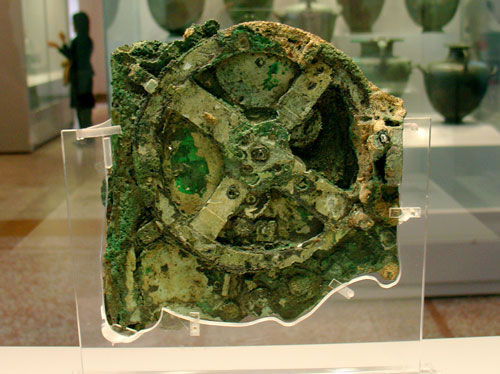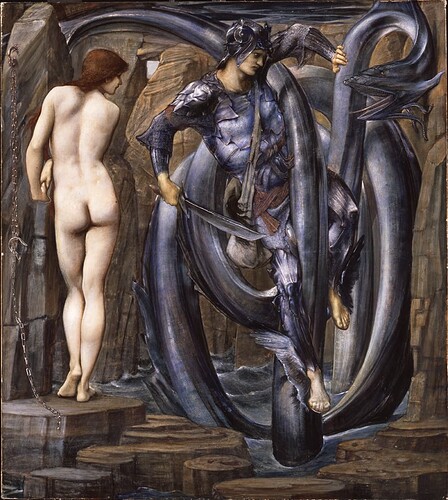When one is so immersed in a culture that you speak its language like a native (and when one has plumbed the depths of a language such that one is immersed in the culture that produced/s it), one’s propensity for poesy is massively enhanced. Keats understood the Greek pantheon so well he spoke its language, as many of his class (and the rest of the “schooled”), did (although most, arguably, not quite as well as John Keats). How then can his work truly be taught today when a “classical” education is a cultural rarity? What disturbs me more though is that our young increasingly speak of no “scientific pantheon” for although both the Norse and Egyptian are still popular their language has not penetrated (esp. in the sciences), to anywhere near the extent of the Greco-Roman.
I don’t have much to offer other than a question: if one were teaching Keats, what would one be hoping to convey?
I whinged about how the “naming of parts” spoiled poetry for me. Counting syllables and admiring the assonance, debating why one word was chosen but not another, itemising the many meanings that are possible. Etc. they’re interesting and engaging as academic exercises but, to me, a poem works, or it doesn’t. It’s a pleasure to read out loud, for example, or it isn’t. Taking it all apart and then putting it back together somehow takes away the “aura”, to paraphrase Benjamin, that an original work possesses but a reproduction cannot.
As for the Graeco-Roman worldview, a surprising amount of the language, and possibly the ideology constructed using it, owes its origins to Sanskrit, which borrowed heavily from Vedic, which flowed from Hittite. Whether those continuities matter all that much I don’t know, but as a way of illuminating that our modern day cleverness has deep deep roots, this stuff does matter.
In a world where education is drill, i.e. training for the adult world (of work, primarily) actual values are denigrated. Maybe that’s why Keats would seem irrelevant?
I don’t believe it’s possible to ‘teach’ literature at all, most particularly poetry. It was this realisation which made me go dormant on my English and European Literature uni course half way through. The quote from Ted Hughes’ writings, about the shamanic dream of the fox, that I put up in a conversation with Rob in a nearby thread, explains quite comprehensively why. A truly critical truth about the hubristic presumption of barren academics, and its fatal destructiveness, is contained there.
At Warwick U I had a lecturer - Susan Bassnett-McGuire - who affirmed that she could teach anyone ACTUALLY TO BE a poet! Perhaps that’s why she was widely known as ‘Susan Fasten It With Wire’. Silly bugger! 
I’m not enough of an expert about Keats to be able to comment.
I could, though, sort of echo Karen and Rhis by saying that poetry is very subjective (it’s what I love about poetry). I could also add that for most of human existence (when most people were illiterate) poetry was the main form of cultural communication.
I understand those who despise form poetry, but it’s purpose was to reach people who couldn’t read and write:
Gather ye rosebuds while ye may,
Old Time is still a-flying:
And this same flower that smiles to-day
To-morrow will be dying.
This will resonate with most people hearing it (not reading it). Herrick lived through outbreaks of the Black Death. Likewise I could bang on about Shakespeare. Both of them understood, in a time of general illiteracy, what poetry was all about, and particularly Shakespeare with his plays.
In my humble opinion, when writers try to intellectualise it too much you start drifting away from what poetry really is. I’m not knocking Keats, who was a brilliant poet. Thing is, across tens of thousands of years, human experience/culture has always been passed to the next generations via poetry; often, on the surface, very simple poetry, but it has a very strong subtext; one that even now can’t be matched by the propaganda outfits that are tv and radio.
Hear hear. There’s a reason, I think, why so many of the earliest known written records turn out to be IOUs. Almost as durable as a Saudi passport.
‘Susan Fasten It With Wire’.
Any relation of Marcel Du Cttape?
I’ll get my coat.
(A favourite quote of the real Duchamp was a postcard, iirc, that read, in part “I am not dead, I am in Herne Bay”.)
Ah but I’m talking about teaching language, history and theology a knowledge of these allows one to study literature…
I’m more interested in the living pantheon…understanding science and religion as a whole without the artifice of the Enlightenment’s division… people don’t think in such terms any-more and an understanding of classical language is just as elitist (if not considerably more so), than it was in Keat’s time. The hydra-headed monster of the compartmentalised disciplines attempts to prevent any understanding of the ecology of biodiversity… the teaching of language comparatively facilitates the teaching of language structure (essential to linguistics), and, like the practical application of mathematical principles is to maths, is vital to an understanding of all language…If Greek and Latin were taught first (as the vernacular is also taught), pupils would have an invaluable grounding in the science of the mechanics of language…

"Killing Medusa
What Polydectes had not known was that Perseus was beloved by the gods. To help him, god Hermes gave him a curved sword and a pair of winged sandals (other versions of the myth say that Hermes did not give Perseus a pair of winged sandals but a white winged horse) while Athena gave him a mirror of polished bronze and a cap from Hades that could make invisible anyone who would wear it. With these divine aids, Perseus started his long journey to the cave of Medousa, somewhere in Africa.
He indeed found lying in her deep cave. Since he was wearing the winged sandals, he could fly around her and since he was wearing the magical cap of Hades, he was invisible. In order to avoid looking Medousa directly to her face and thereby being turned into a stone, Perseus approached Medousa looking at her reflection in the mirror and cut off her head with the sword of Hermes. So easily then, the brave and intelligent Perseus managed to complete this difficult task!" https://www.greeka.com/greece-myths/perseus-andromeda/
I don’t think Keat’s thought he was intellectualising…he was merely using the cultural landmarks and trig points which he had been taught (as many were), …
“As for the Graeco-Roman worldview, a surprising amount of the language, and possibly the ideology constructed using it, owes its origins to Sanskrit, which borrowed heavily from Vedic, which flowed from Hittite” I would say surely (for the most part but I think the Indus/Saraswati culture either predated or was concomitant with the Hittite -who became the Trojans from whom we get some of the language we use today-), however, astrology (a basis for many myths…in-fact it’s pretty much the central point of this thread -that natural forces were “embodied” as such-), perforce varies from region to region…
https://www.arafel.co.uk/2019/04/britons-hidden-law-permaculture.html & https://www.arafel.co.uk/2019/04/britains-hidden-lore-cont-resolution.html
I can find no articles on the possible #astronomy #astrology #astrologomy of (esp. large scale), #migrations of #fauna I suspect a secret of #GobekliTepe Has anyone studied this? Lyall Watson (RIP), would have been a good candidate to do a study…

The effect of the #Moon is well known and accepted now: https://sciencedaily.com/releases/2019/10/191016124625.htm, https://discoverwildlife.com/animal-facts/ways-moon-affects-wildlife/ & https://newscientist.com/article/2219944-nightjars-time-their-epic-migration-flights-using-a-lunar-calendar/
#LyallWatsonRIP #Supernature
The passage of the Sun (and planets), into certain constellations presaged the relevant moon…esp. important to predict (“before say”), because of the variability of phase…
It may be that Gobekli Tepe was a “reference work” containing/embodying all sorts of information (esp. of the astronomical/astrological kind; “”#Astrologomy"= astrology/astronomy, I’m convinced S.A.M -“Stone Aged Man”- would have laughed at the idea of “splitting the sky in two” either that or considered the notion very bad medicine indeed!" : https://www.arafel.co.uk/2012/06/whats-that-coming-over-hill.html), regarding the life cycles of the fauna and flora of the (then and there), “known world” (the site is situated on the border between Anatolia and the Levant) . Thank goodness they buried it instead of burning it to the ground! It is an unusual place; " A hitherto unknown type of skull modification has recently been observed at Göbekli Tepe in Southeast Anatolia. Fragments of three human skulls have been recovered, all of which carry intentional deep incisions along their sagittal axes. In one of these cases, a drilled perforation is also attested. These findings are outstanding because they provide the very first osteological evidence for the treatment of the dead at Göbekli Tepe. The monumental stone buildings and rich symbolism encountered at this site have provided unprecedented insights into human belief systems and worldview at the Neolithic transition in one of its earliest geographical regions of genesis (11). Here, we present results from the analyses of these modifications according to several technical features. Results are compared with modified skulls from other Neolithic sites and examples from ethnographic research. Finally, we discuss whether the deep incisions (hereinafter also referred to as “carvings”) are congruous with activities associated with a variation of skull cult that is perhaps distinct to the site of Göbekli Tepe." https://advances.sciencemag.org/content/3/6/e1700564

If Gobekli Tepe isn’t a repository of knowledge what else could it be? It will refer to the vital concerns of the culture and community. These people managed their environment, this is surely clear, and how else would they manage it than by understanding and working with the rhythms of nature? Modern man simply doesn’t think the same way, gaflah and its gewgaws embody the separation (taking a wider evolutionary viewpoint the “loss of oneness” can be seen as the two steps backward we needed to take to be able to move forward again -but move forward we must-), so few bother to watch the night skies for most can hardly see them!
PS: Thanks K for the ‘Herne Bay’ guffaw! 
Not in any detail but there’s some quite good, brief, material in The Megalithic European by Julian Cope, and that led me here:
https://www.dainst.blog/the-tepe-telegrams
This is close by the building I am based in
…err, I’d just like to note that me and my other half are mentioned in Julian’s Modern Antiquarian - he used a photo of ours for his Ilkley Moor, 12 Apostles’ entry. There’s also a photo of us taken by Julian when we bumped into him and his mate Flinton Chalk whist attempting to visit every recumbant circle in Aberdeenshire - - we were competing for Julian’s confected ‘Champion of the Grampians’ award - that photo is in MA under the East Aquhorthies entry…
…boasting aside ; ) let’s return to the poetic thrust:
…Roman Thought, mine enemy
Mine enemy and thine
Roman thought I do defy
By walking Serpentine,
And through steep-sided valleys
Close to tributaries divine
I beat that curse-d Roman Thought
That cult of the Straight Line
Dancing -
Ever Singing -
Ever Breathing -
Ever More!
JC (1992 C.E.)
I can only say #Cooobrick (terrible bad pun requiring an endorsement of my poetic licence!), …
https://www.arafel.co.uk/2013/12/blog-post.html

“Greco”… never made it to Rome!
I enjoy the esoteric, although it’s not usually territory I get into with poetry. Yes, I know that might seem like a contradiction in terms (I don’t have the energy to explain at the moment).
The following is often said to be one of TS Eliot’s ‘minor poems’. For me it’s one of the best poems he ever wrote. Keats (and Larkin, et al) are often too ‘dry’ for my tastes. This Eliot poem is so visceral it will literally come up and bite you.
Again, close your eyes and imagine listening to a recital of this piece.
TS did balls-up the final two lines of this poem. I dunno, maybe he did that on purpose…
Lines for an Old Man
T. S. Eliot
The tiger in the tiger-pit
Is not more irritable than I.
The whipping tail is not more still
Than when I smell the enemy
Writhing in the essential blood
Or dangling from the friendly tree.
When I lay bare the tooth of wit
The hissing over the arched tongue
Is more affectionate than hate,
More bitter than the love of youth,
And inaccessible by the young.
Reflected from my golden eye
The dullard knows that he is mad.
Tell me if I am not glad!
Oh, and I should also add that the TS piece is what I would call a semi-sonnet: written in 14 lines (all in wonky tetrametre), and the only real rhyme was at that those last two lines.
Just for balance.
It’s still a brilliant poem, though.
Speaking of Tigers and the esoteric… https://www.youtube.com/watch?v=IUvpkk8Qx2o
for they are wonderful things!
Hey Si. MA is one of my most prized possessions, have signed copy, but know all too well to never trust the directions. Checked out page 381 (and the Ilkley Moor photo is marvellous).
Can’t quite place the Cope lyric, if it is a lyric. I do wish sometimes I could rewind time to a moment before I read 131…
As for straight lines and linear thought, I tend to agree with JC that meandering is more in tune with nature. Very fond of The Old Straight Track nevertheless.
They are. We have a tabby who is a decent scaled down facsimile. I often wonder if Tigers have coarse hair or if they’re fluffy, but I guess that will have to stay filed under life’s little mysteries 
I have a filing cabinet that (by rights), should have a sign on it warning to; “beware of the leopard!”
